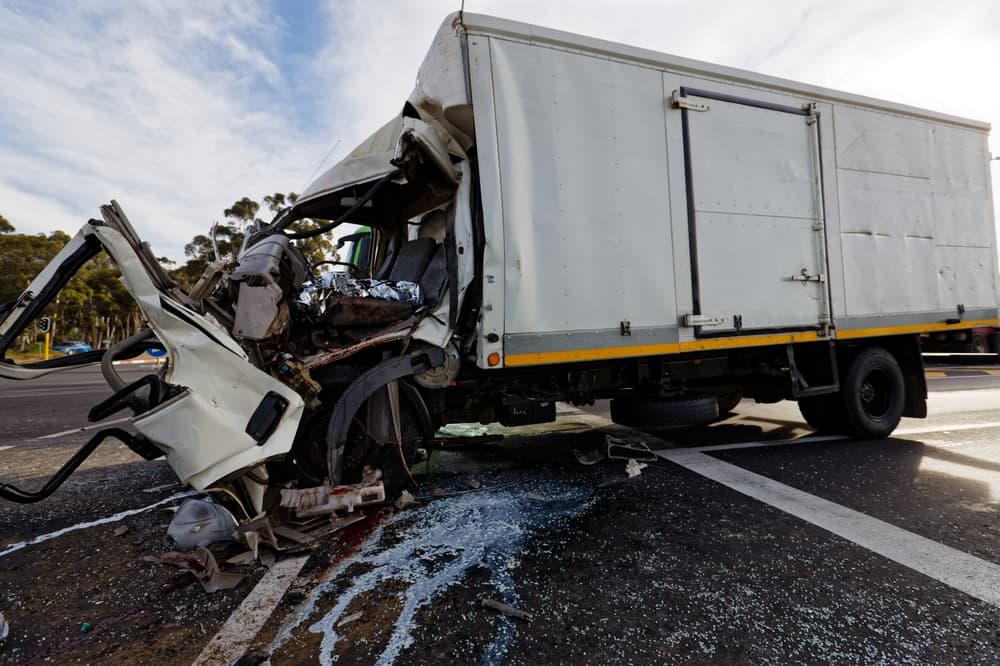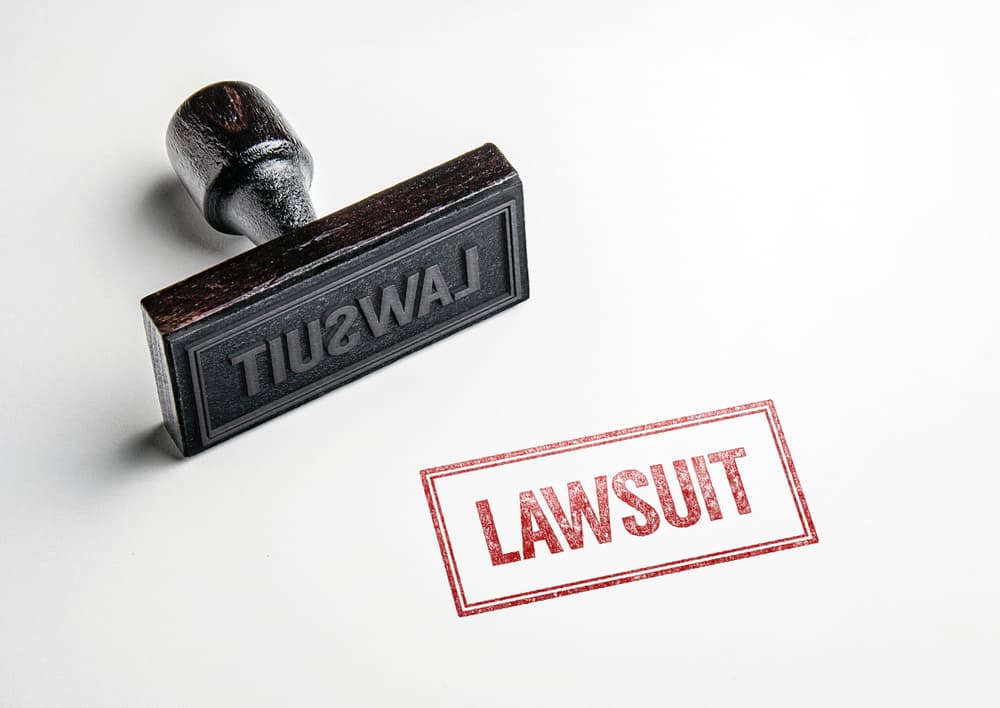A truck accident can be a life-changing experience for anyone involved. These accidents cause hundreds of thousands of injuries and thousands of deaths every year. Fortunately, however, injured victims and families of those who died in truck accidents can seek compensation for their losses from liable parties.
When insurance companies are uncooperative, victims might have to file a lawsuit in civil court. Below is a brief overview of the lawsuit process. If you need to file a claim, immediately consult a Creve Coeur truck accident attorney.
Elements to Prove in a Truck Accident Lawsuit

Nearly every truck accident case is based on the theory of negligence. The legal term “negligence” refers to a person’s deviation from the standard of care that a reasonable and ordinary person would use in similar circumstances. Thus, when pursuing a truck accident lawsuit, you must establish that the other party involved was negligent. This involves proving the following elements:
- Duty of care. The plaintiff (the injured person or family members of those killed) must prove that the truck driver had a duty of care to the plaintiff. Essentially, this means the truck driver had a legal obligation to operate the vehicle in a reasonably safe manner to avoid causing injuries or death to your loved one. This is generally a given, as all drivers have an implicit duty of care towards other roadway users.
- Breach of duty. Once a plaintiff establishes a duty, they must prove there was a breach of duty. The plaintiff must demonstrate the truck driver failed to fulfill their duty of care. This can include violating traffic laws or not adhering to the federal regulations set for trucking operations.
- Causation. Under the law, it’s insufficient to show that the truck driver breached their duty. The plaintiff must also prove that this breach directly caused the accident and the injuries or death. This is to say, the breach of duty is the proximate cause of the damage. This can sometimes be the most challenging element to prove since there can be other potential factors that contributed to the accident.
- Damages. Your case against the defendant is incomplete until you can prove that you suffered damages due to the accident. Damages can be physical, emotional, or financial. This includes medical expenses, loss of income, property damage, and other losses that are direct results of the truck accident. The plaintiff is usually expected to provide medical records, employment documents, and other pertinent records to substantiate these claims.
Proving these elements, particularly causation, may not be easy without the assistance of a lawyer. A lawyer can provide the legal guidance you need to secure fair compensation through an insurance claim or lawsuit.
Steps to Take Before Filing a Truck Accident Lawsuit
Before we discuss what to expect once you file a lawsuit, here are some essential steps before initiating court proceedings in your truck accident case:
- Hire a lawyer. Securing legal representation is an important step to take. An experienced lawyer can provide invaluable guidance through the complexities of your case, including navigating Federal Motor Carrier Safety Administration (FMCSA) regulations and industry standards that may impact your claim.
- Gather evidence for your case. Solid evidence is the foundation of a strong truck accident case. Immediately after the accident – and as your health allows – begin compiling relevant information supporting your claim. However, if you have legal representation, you do not have to wait until you get back on your feet to gather evidence, as your lawyer will do it for you.
- Write a demand letter. A demand letter outlines your case, including the facts of the accident, your injuries, and a request for compensation. It is sent to the responsible party or their insurance company and marks the beginning of settlement negotiations.
- Negotiate a settlement. Many truck accident claims are settled out of court. Settlement negotiations can be a delicate process and often require a lawyer's experience.
These are the essential steps to take in preparation for filing a truck accident lawsuit. If the parties can agree to a mutually acceptable settlement at the fourth step, litigation will be unnecessary.
What Happens After You File a Lawsuit?

Once you file the paperwork to initiate legal action against the defendant, you can expect the following to happen:
Serving the Defendant
After filing your lawsuit, the first step is serving the defendant with the complaint and summons. This legal document notifies the defendant of the lawsuit and outlines the allegations against them. The defendant then has limited time to respond or file a counterclaim. They must be served correctly, as it legally obligates them to respond to your lawsuit.
Discovery
Once the defendant has been served and responded, both parties enter a discovery phase. During discovery, both sides exchange information related to the case. This can include collecting documents, depositions, and requests for admission. Discovery allows both parties to fully understand the case’s facts before it proceeds to trial.
Pre-Trial Motions
Either party can file pre-trial motions to resolve some specific issues before the trial begins. These motions might seek to exclude certain evidence, dismiss parts of the case, or sometimes, even dismiss the case entirely if there are grounds to believe that there are no legal bases to proceed.
Pre-Trial Settlement Negotiations
Many cases are settled out of court, and yours can be too. Pre-trial settlement negotiations are efforts by both parties to come to an agreement and avoid the need for a trial. These negotiations can be informal discussions or formal mediation sessions. Even if a case goes to trial, settlement negotiations can continue up to and through the trial process.
Trial
Both sides present evidence and arguments to a judge or jury at trial. Witnesses can be called and cross-examined. During the trial, plaintiffs have the burden of proving their case by a preponderance of the evidence.
Verdict, Award, and Appeals
At the end of the trial, the judge or jury will reach a verdict. If the decision is in your favor, the court will determine the compensation or damages you are entitled to. The verdict may cover medical expenses, lost income, diminished earning capacity, reduced quality of life, property damage, emotional distress, and many more. However, remember that the losing party has the right to appeal the decision, which can extend the time before any compensation is paid.
What Evidence Do You Need for a Truck Accident Lawsuit?
Your chances of success when filing a truck accident lawsuit can be attributed to the strength of your case. The strength of your case, in turn, depends on the availability of evidence that proves your arguments. Such evidence can include:
- Accident scene photos. Photographs can serve as compelling evidence in any vehicle accident case as they can depict the aftermath of the accident, vehicle damage, road conditions, traffic signals, and any environmental factors that might have contributed to the accident.
- Surveillance camera footage. Footage from nearby security cameras can provide an objective viewpoint on how the accident occurred, offering invaluable insights into the mechanics of the crash and the behaviors of the drivers involved.
- Dashcam recordings. If your vehicle or any surrounding cars are equipped with a dashcam, such recordings can present a clear timeline of events leading up to the collision and show what each party involved was doing when the crash occurred.
- The truck’s electronic logging device (ELD) data. Trucks are often outfitted with electronic logging devices that record details about the truck’s operation. This data can also verify the number of hours the driver spent on the road, which may help prove that the driver was fatigued and overworked.
- Witness statements. The accounts of bystanders or other drivers who witnessed the accident can corroborate details and help construct an accurate reconstruction of the event.
- Police accident reports. Law enforcement officers responding to the accident will usually compile a report that generally includes statements from those involved as well as the officer’s assessment of the scene. These reports can be crucial when establishing liability.
- The truck driver’s cell phone records. These records can reveal if the truck driver was distracted by a phone call or text message at the time of the accident. However, obtaining access to these records can be challenging, especially if you are not represented by a lawyer.
- Truck maintenance logs. A truck’s maintenance records may show a pattern of neglect that might have led to mechanical failures causing the accident.
- The driver’s hours of service (HOS) logs. HOS logs can indicate whether the driver complied with federal regulations concerning the maximum allowed driving hours, potentially suggesting driver fatigue.
- Blood alcohol or drug test results from the driver. Such test results can establish if the driver was under the influence of alcohol or drugs. Statistically speaking, impairment is the second leading driver-related factor (after speeding) recorded in fatal trucking accidents.
- Expert witness testimonies. Professionals in traffic accident reconstruction or trucking regulations can provide authoritative opinions that substantiate the evidence you or your lawyer presented.
- The truck’s GPS data. GPS data can offer information about the truck’s route, speed, and behavior patterns before the collision, all of which can help prove the trucker’s liability in a lawsuit.
- Black box or event data recorder (EDR) information. Similar to airplanes, many commercial trucks have a “black box” that records vital data before, during, and after a crash, providing more context about the truck’s performance and driver’s actions.
- Cargo loading records. Improperly loaded or secured cargo can result in a truck being unstable, which is why the FMCSA imposes strict regulations for loading and securing cargo. Cargo loading records can verify whether or not the cargo was properly distributed and adequately secured.
Collecting this evidence quickly after a truck accident is critical because some data may be susceptible to being lost or destroyed. Contacting a lawyer soon after your accident can preserve this evidence and protect your rights.
Do You Need a Lawyer When Filing a Truck Accident Lawsuit?

“Now that I know how to file a truck accident lawsuit, why do I need to hire a lawyer?” you might be wondering. A basic understanding of what filing a lawsuit entails is not a substitute for extensive litigation experience. Further, a truck accident attorney can address the following:
- Federal and state trucking regulations. Federal and state governments impose stringent regulations on the trucking industry, covering everything from hours of service to maintenance requirements. These laws are constantly evolving and require an understanding beyond the grasp of most people with no legal background.
- Determining liability. Identifying who is at fault for a truck accident can be challenging for two reasons: there may be multiple liable parties, and trucking companies usually have a team of lawyers to protect the company from liability claims. A skilled lawyer can effectively navigate the legal nuances in determining liability.
- Calculating damages. Calculating the compensation you are entitled to after the accident incorporates not only your current medical expenses and lost income but also long-term costs and losses. Accuracy in this calculation is paramount and is best handled by a lawyer with sufficient legal experience.
- Evidence gathering. Collecting evidence in a truck accident lawsuit may include accessing logbooks and maintenance records and securing black box data. A knowledgeable attorney has the resources and experience to undertake a comprehensive investigation on your behalf and obtain evidence that may be inaccessible to you without legal representation.
- Negotiation. A lawyer with experience in negotiations can substantiate your arguments with well-compiled evidence and present your case persuasively, leading to a more favorable settlement offer. Without knowing the legal nuances, you might struggle to negotiate effectively and risk leaving substantial sums on the table.
- Urgency and the statute of limitations. Every state imposes a statute of limitations – a limited timeframe within which you must file a lawsuit. In Missouri, that limit is five years from the date of the injury (MO Rev Stat § 516.120). Missing this period can result in losing your right to seek compensation. While five years might seem like a long time, it is still critical to consult with a lawyer soon after your accident to ensure legal proceedings commence promptly.
Given the complexity of truck accident lawsuits, having an attorney is not only beneficial but should be considered essential. An experienced lawyer will provide tailored support, guide you through the legal proceedings, and advocate relentlessly on your behalf.

To stand the best chance of receiving the compensation you deserve, consider securing a lawyer with a track record of success in safeguarding victims’ rights against trucking and insurance companies. Your recovery is the priority, so let a dedicated injury lawyer in Creve Coeur shoulder the legal burden.


